December 16, 2015
By Emily Brooks
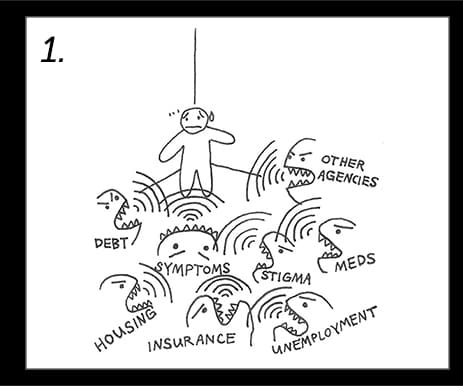
When living with a mental health condition, it can weave through all aspects of our lives. In addition to managing our own private conflicts with symptoms or medications, we may also balance external pressures and limitations, such as stigma, tension at work or increased financial burden. When this becomes unbearable, it can feel as though we’re trapped in a corner—with everything and everyone trying to get the best of us. Unfortunately, these are the times when we are stretched thin, and there is little of ourselves free to give.
In situations like these, it can help to know that there are others out there who understand because they’ve been through it too. NAMI’s online discussion groups are a great way to get involved with an encouraging community that’s always available. Some people may prefer in-person reassurance through our local NAMI support groups. At NAMI, we may offer peer support or referrals to warm lines, which serve as an outlet to vent, get feedback and connect with other people who can empathize.
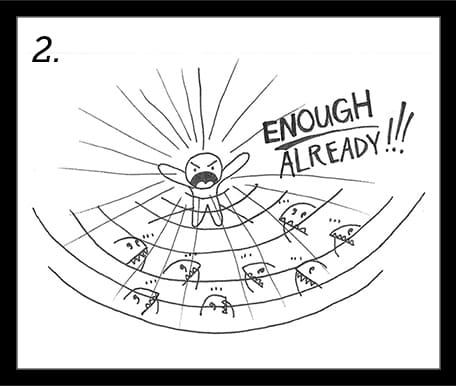
When confronted with so many demands, it’s natural to buckle under the pressure. Our brain’s inherent response to threatening levels of stress is to enter “fight or flight” mode. Although flight guarantees our safety by removing us from the source of fear, it is ultimately a short-term solution. When we fight, we make a choice to face these challenges head-on and triumph by advocating for ourselves. Choosing to fight shows we have hope; we’re willing to take risks and stand up for the recovery we know we deserve, no matter what stands in our way.
Although we may feel apprehensive when we decide to take charge, this is an empowering choice. You are not alone in this fight! Taking the NAMI StigmaFree pledge is a simple way to declare your resolve, spread mental health awareness and use education to further acceptance. If you’d like to take your advocacy to the next level, see what mental health policy issues currently need your support. To determine solutions for your own fight, you can always call the NAMI HelpLine to identify what tools and resources are available to you.
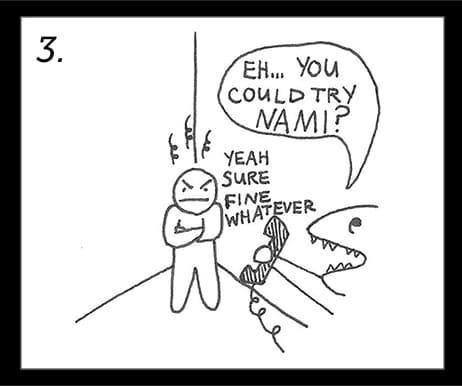
In the midst of it all, there is NAMI. You may wonder, “How is NAMI different from everyone else?” Although it may be our first time speaking with you, we know that NAMI could be the 15th number you’ve called today. It’s understandable to feel jaded and lower our expectations after encountering much of the same. NAMI is distinct from other organizations not because of what we offer, but how we offer it. Here at NAMI, we’re not professionals, doctors or lawmakers—we’re folks living with a personal connection to mental illness, and we know what it’s like.
When you call NAMI, we offer connections to local outreach and support. More importantly, though, we try to offer hope. Nothing’s worse than being put on hold, transferred, or added to an endless queue. When you call NAMI, we want you to feel heard, to know that your call is important, and to can gain something meaningful through our conversation.
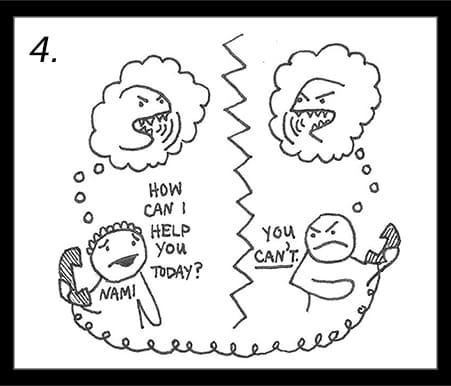
Often times, it’s tough to take that first step and reach out for help. It may also be difficult to remain helpful and present when someone needs our support. To succeed, we need to give each other the chance to work together, which doesn’t always come naturally. It’s easy to be combative, especially when we’re in fight mode. Our instinct is to defend ourselves when dealing with uncomfortable situations.
It’s important to remember why we’re having this conversation in the first place: to help, to learn and to connect. When we view each other as a potential threat, we have already decided to enter flight mode—we’re running away from true understanding. It can feel vulnerable to follow the pathways that lead to insight, but if we walk together, we can face them with resilience. When you’re ready to share your story, submit to our blogs OK2Talk and You Are Not Alone. There, you can lead the way for those who are gathering the courage to open up, or find help from those who already know which ways to go. If you need help getting started, view our information on disclosing to others or supporting recovery.
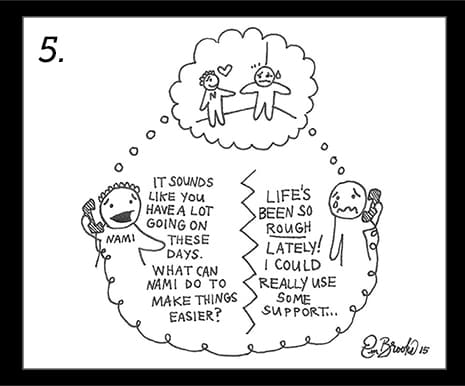
When we let our guard down, we make room for empathy and understanding. We must consider that the other person may be coming from a place of fear, confusion or hurt. Although we should validate those feelings, we cannot let them interfere with the quality of our interaction. By imagining how we might react upon encountering the situation in our own lives, we allow ourselves to develop solutions that will be intuitive and accessible.
If we unify our vision for growth, we can partner to accomplish more. NAMI’s Education Classes serve as a valuable opportunity to share lessons and skills together. By viewing success as our responsibility to each other, we invest in the conversation. As Shannon L. Alder wrote, “When ‘I’ is replaced by ‘We,’ even illness becomes wellness.” At NAMI, we’re here for you. Call us at 800-950-NAMI (6264) from Monday-Friday, between 10 a.m. – 6 p.m. EST.
We’re always accepting submissions to the NAMI Blog! We feature the latest research, stories of recovery, ways to end stigma and strategies for living well with mental illness. Most importantly: We feature your voices.
LEARN MORENAMI HelpLine is available M-F, 10 a.m. – 10 p.m. ET. Call 800-950-6264,
text “NAMI” to 62640, or email. In a crisis, call or text 988 (24/7).